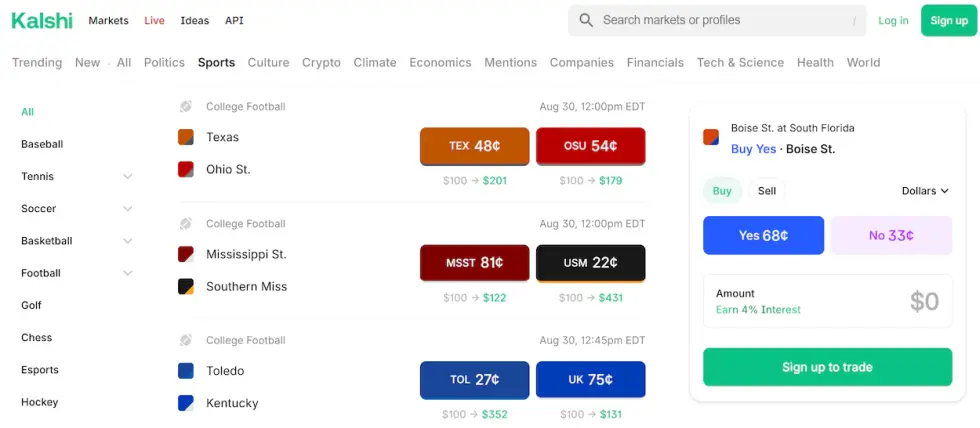Michigan Tells Its Sportsbooks to Stay Away from Prediction Markets
Michigan regulators have warned licensed sportsbooks to avoid involvement in sports event prediction markets, joining a growing list of states raising concerns about the sector.

The Michigan Gaming Control Board (MGCB) recently sent a memo to operators stating that any engagement in prediction markets could impact their licensing status. The notice followed the regulator's earlier decision to open an investigation into sports-related prediction market activity in April. The MGCB emphasized that its oversight responsibilities include developing and enforcing licensing standards and continuously evaluating operator suitability.
Related: Massachusetts is Suing Kalshi for Offering Sports BettingThe MGCB's warning comes amid growing national attention on prediction markets, which allow users to trade contracts based on the outcome of future events. While these platforms are federally regulated by the US Commodity Futures Trading Commission (CFTC), several states have expressed concern that they may effectively function as unlicensed sports betting. The Michigan regulator clarified that any operator or associated entity offering event-based contracts could face regulatory action if the activity is deemed to violate state gaming laws.
In recent months, other state agencies have issued similar directives. The Ohio Casino Control Commission, the Arizona Department of Gaming, and regulators in Illinois and Montana have all sent warning letters or cease-and-desist notices regarding prediction market activity. Each has cited potential conflicts with existing sports wagering laws, arguing that these markets blur the line between legal gaming and speculative trading.
The rise of event-based markets has drawn significant interest from major industry players. FanDuel recently announced a partnership with CME Group to develop an events-based trading product, and Underdog entered a deal with Crypto.com to explore similar opportunities.
DraftKings CEO Jason Robins has also publicly discussed the potential of prediction markets within regulated gaming environments. However, state regulators are signaling that such ventures must comply with local betting laws and licensing requirements before proceeding.
More Regulation
Several States Speak Up Against Prediction Markets
Massachusetts has taken an especially firm stance. Last month, Attorney General Andrea Campbell filed a lawsuit against Kalshi, a federally regulated prediction platform, alleging that its sports event contracts constitute unlicensed sports betting under state law. The complaint followed similar actions from regulators in California, Maryland, Nevada, and New Jersey. Campbell stated that sports wagering carries substantial risks and must remain under strict state oversight to prevent addiction and financial harm.
Earlier this year, Ohio's gaming commission directed Kalshi to halt operations related to sports outcomes within the state. Other regulators have mirrored that approach, warning that unapproved prediction contracts could jeopardize operators' licensing prospects or result in legal penalties. The MGCB reiterated that any operator planning to offer such products must inform the board in advance and seek appropriate authorization.
Despite the regulatory pushback, prediction market platforms continue to expand. Kalshi launched sports event contracts in January and has since broadened its offerings, including multi-event parlay-style products. Financial services firm Robinhood began integrating Kalshi's football markets into its platform at the start of the season, reflecting broader industry interest in merging financial-style trading with sports outcomes.
At a recent roundtable organized by the CFTC and the US Securities and Exchange Commission, regulators and industry representatives discussed cooperative oversight strategies. Prediction markets received limited focus during the session, despite recent warnings from outgoing CFTC officials about the segment's weak regulatory safeguards.
RELATED TOPICS: Regulation
Most Read
Must Read
 Interviews
Interviews
Exclusive Interview: Levon Nikoghosyan Shares AffPapa Winning Formula for Successful iGaming Events
Dec 03, 2025 Interviews
Interviews






Review this New Post
Leave a Comment
User Comments
Comments for Michigan Tells Its Sportsbooks to Stay Away from Prediction Markets